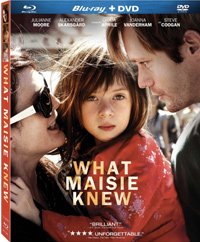 In this contemporary rendering from the executive producers of The Kids Are All Right, the brilliantly written characters of Henry James are relocated to Manhattan and collapsed into recognizable self-serving urbanites. Though lacking the complexity of its literary roots, gifted directors Scott McGehee and David Siegel obsessively prioritize point of view in a way that is faithful to the novel. In the 2012 Toronto Int. Film Festival selected What Maisie Knew, the ugliness and volatility of custody battle limbo is seen entirely through the watchful eyes of the 6-year-old title character (Onata Aprile). Her parents, Beale (Steve Coogan) and Susanna (Julianne Moore), a British art dealer and nearly washed-up alt-rockstar, have a mutual affinity for arguing and telling Maisie thinly veiled half-truths. Too busy hating each other and loving their careers to acknowledge damaging behavior, they seemingly subscribe to the convenient notion that children are resilient or entirely unaware.
In this contemporary rendering from the executive producers of The Kids Are All Right, the brilliantly written characters of Henry James are relocated to Manhattan and collapsed into recognizable self-serving urbanites. Though lacking the complexity of its literary roots, gifted directors Scott McGehee and David Siegel obsessively prioritize point of view in a way that is faithful to the novel. In the 2012 Toronto Int. Film Festival selected What Maisie Knew, the ugliness and volatility of custody battle limbo is seen entirely through the watchful eyes of the 6-year-old title character (Onata Aprile). Her parents, Beale (Steve Coogan) and Susanna (Julianne Moore), a British art dealer and nearly washed-up alt-rockstar, have a mutual affinity for arguing and telling Maisie thinly veiled half-truths. Too busy hating each other and loving their careers to acknowledge damaging behavior, they seemingly subscribe to the convenient notion that children are resilient or entirely unaware.
From overheard angry phone calls and being confided in like a sympathetic shrink, Maisie knows more than enough. Even before the exhausting legal stuff is over, both parents shack up with beautiful people much nicer and younger than themselves. Maisie candidly announces the news in her classroom, saying “my daddy married my nanny, so the court made my mommy marry Lincoln”. Though Maisie was showered with extravagant gifts and sometimes smothering affection, the ill-expressed love from her parents was always inseparable from a selfish desperation to be loved in return. Pseudo-stepparents Margo (Joanna Vanderham) and Lincoln (Alexander Skarsgård) finally love Maisie altruistically, but add players to an already confusing custody game.
Cinematography from Giles Nuttgens captures artful interiors, especially a maze-like Tribeca apartment, with such openness that Maisie appears even smaller. Expressive location shooting furthermore gives a sense of impermanence, as certain gestures like preparing meals and waking up in the morning are repeated in new places. While just outside of these super stylish homes infected with perpetual shouting, chaotic city streets and antagonistic honking taxis are similarly anxiety inspiring. The noise that thickens atmospheric tension is met with silent observation from Maisie, as she exudes incredible grace. This unexpected composure nearly pushes her character into the realms of merely mythic, while the reality that comparable purity is rare yields a noble message – childhood innocence must be held sacred.
Disc Review
Millennium Entertainment released What Maisie Knew on August 13th. Special Features on the DVD and Blu-ray Combo Pack include commentary from directors Scott McGehee and David Siegel, a handful of trailers for films distributed by Millennium Entertainment and four scenes that were rightfully deleted.
Directors’ Commentary
Far from supplying any sweeping insight, the commentary is mostly lighthearted banter about the production process. The directors discuss atmosphere and location, confirming the intentionality behind that unmistakable New York energy and intelligent avoidance of overused landmarks. The remainder is cutesy trivia – what dialogue was improv, the challenge of situating the giant Alexander Skarsgård in a frame with his tiny costar, that Joanna Vanderham is terrified of puppets and Onata Aprile kept the pet turtle.
Deleted Scenes
It is evident that the deleted scenes were not painfully sacrificed to shorten run time, as they are both brief and ineffective. Maisie can be seen here wandering unaccompanied and being used as photo shoot prop. These more appalling moments of shameful parenting were likely eliminated to allow for some degree of humanistic empathy, while another deleted scene lacks all subtlety and is only worthy of an eye-roll. After Maisie tells a locksmith about the time her mother changed the locks on her father, she is assured that the lock at the beach house is simply broken. The distinction is a heavyhanded promise of security, as getting locked out is a re-occurrence that otherwise recommends instability. There is an organic hopefulness without this scene and though their tender exchange shows indiscriminating warmth, her tendency to connect with strangers may be found elsewhere. The included music video is impressive considering Julianne Moore is not a singer, but the same footage appears in the film more purposefully. Her performance in its entirety strains the already unconvincing rocker persona, but works in the final feature as a potent signifier when Susanna narcissistically watches her own music video.
Final Thoughts
The simple film almost drowns in idealism, but the infectious giggle and memorable naturalism of Onata Aprile, whose debut performance cannot be missed, will make you fall so deeply in love with her that the tidy fairy tale ending is blamelessly satisfying. The cinematography deserves the best quality viewing and admittedly, the watchable savior stepparents look even lovelier on Blu-ray. While the special features seem to be added for the sake of offering something extra, the likelihood of revisiting What Maisie Knew anytime you need a little restored faith in happy endings makes the disc a worthwhile purchase.


